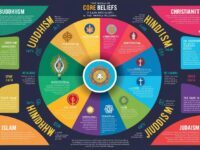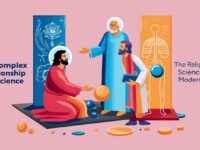In a world increasingly defined by diversity and plurality, the ethical teachings of historical figures like Buddha, Jesus, and Muhammad offer timeless wisdom. These spiritual leaders, hailing from different regions and cultural backgrounds, all sought to answer fundamental questions about how humans should live and relate to one another. Their insights continue to shape moral philosophies and religious practices across the globe. Let’s delve into the ethical teachings of these global icons to see what lessons they might offer us today.
Unpacking the Ethical Wisdom of Global Icons
The teachings of Buddha, Jesus, and Muhammad have been central to the moral and ethical frameworks of billions throughout history. Each of these figures presented a vision of ethics that transcends cultural and temporal boundaries. Buddha emphasized the Middle Way—an ethical path that avoids extremes and seeks balance. His Four Noble Truths and the Eightfold Path provide a comprehensive guide to achieving personal liberation from suffering, advocating for compassion and mindfulness in every action.
Jesus, on the other hand, emphasized love and forgiveness as the cornerstones of ethical living. The Sermon on the Mount encapsulates much of his moral philosophy, urging followers to turn the other cheek, love their neighbors as themselves, and even love their enemies. His teachings challenge adherents to respond to wrongdoing with grace and mercy, promoting a radical form of empathy and altruism that has resonated with millions worldwide.
Muhammad’s ethical teachings, as recorded in the Quran and Hadith, stress the importance of justice, charity, and community. The Five Pillars of Islam encapsulate these principles, encouraging Muslims to live lives of moderation, generosity, and devotion. Muhammad’s emphasis on social justice and care for the needy reflects a profound commitment to building a fair and equitable society. His leadership and vision have inspired generations to pursue justice and compassion in their communities.
Lessons in Morality from Buddha, Jesus, and Muhammad
From Buddha’s teachings, one of the key moral lessons is the importance of mindfulness and self-awareness. By understanding the nature of suffering and cultivating a compassionate heart, individuals can navigate the complexities of life with inner peace and clarity. This approach fosters an ethical mindset that values empathy and understanding over judgment and anger. Furthermore, the principle of non-attachment encourages people to let go of desires and ego-driven motives that often lead to ethical lapses.
Jesus’s message of unconditional love and forgiveness urges us to look beyond our immediate grievances and prejudices. By promoting the idea of loving one’s neighbor and enemy alike, Jesus offers a transformative vision of community and reconciliation. The Golden Rule—do unto others as you would have them do unto you—remains a powerful ethical guideline, emphasizing reciprocity and respect in human interactions. His teachings inspire countless individuals to act with kindness and generosity, even in the face of adversity.
Muhammad’s emphasis on justice and community care teaches us the value of social responsibility. His instruction to protect the rights of the vulnerable, support the indigent, and uphold truth and fairness in all dealings underscores the importance of ethical governance and societal well-being. The principles of Zakat (charitable giving) and social solidarity emphasize that individual prosperity should contribute to the collective good, fostering a sense of shared responsibility and interconnectedness.
The ethical teachings of Buddha, Jesus, and Muhammad continue to offer valuable insights for contemporary moral discourse. In their unique ways, they champion compassion, justice, and love—principles that are crucial in navigating the moral challenges of today. By reflecting on their wisdom, we can gain a deeper understanding of how to live ethically in a complex and interconnected world. As we strive to build societies rooted in peace and mutual respect, the timeless lessons from these spiritual giants remain as relevant as ever, guiding us toward a more harmonious and ethical existence.

















